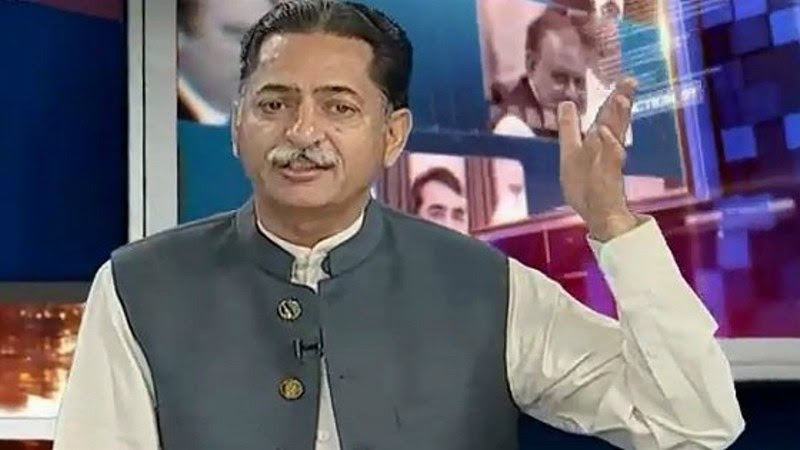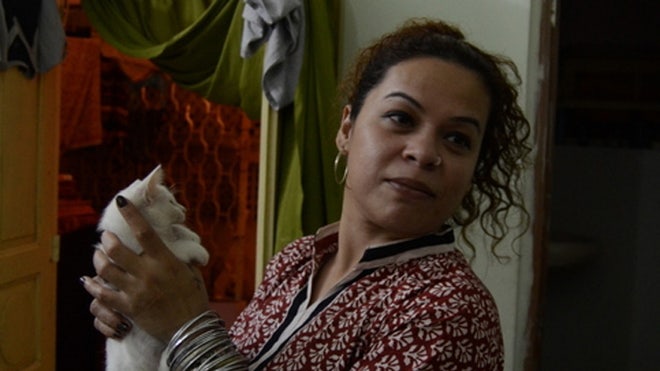What ever Javed Latif said cannot and should not be defended – Period !
Our Announcements
Sorry, but you are looking for something that isn't here.
Posted by Rose in Leaders, Pakistani Modern Women Thinkers, Scholars, Soldiers, Women In Islam, Women Politicians on March 11th, 2017
Courtesy DAWN

Name-calling and fist fights are not uncommon when opposing politicians get together. But yesterday’s brawl between PTI lawmaker Murad Saeed and PML-N lawmaker Javed Latif underscored a disturbing trend.
During a press conference after an argument during a National Assembly session, Latif is reported to have passed distasteful remarks about Saeed’s sisters in connection with PTI Chairman Imran Khan.
His comments invited censure from all quarters, so much so that his name was soon trending on Twitter.
What ever Javed Latif said cannot and should not be defended – Period !
We just celebrated #womensday yesterday giving lectures on respect/rights and then we have MNAs like Jawed Latif sitting in our Parliament
However, this isn’t the first time women were disrespected at National Assembly.
Here’s a list.
According to veteran journalist Nusrat Javeed, Sheikh Rasheed was one of the first politicians to be observed passing derogatory remarks to his female peers.
“Benazir Bhutto was wearing a Pakistani green shirt and white shalwar. When she walked in, he quipped ‘You look like a veritable parrot’, which did not go down well with Ms. Bhutto at all and caused a ruckus in the house,” he recalled ina conversation with Dawn.
When Begum Zahid Khaleequzaman was minister for railways, Nusrat Javeed recalls her commenting on her workload thus: ‘I have so much work that I have one foot in Karachi and the other in Rawalpindi’.
“At this, someone from the backbenches had shouted ‘The people of Rahim Yar Khan must be enjoying themselves’.”
Before he infamously referred to PTI whip Shireen Mazari as a “tractor trolley” (more on that below), Defence Minister Khwaja Asif is reported to have called PML-Q’s Begum Mehnaz Rafi a “penguin” in reference to her limp.
At a National Assembly sessionin June 2016, Khawaja Asif was giving a speech on load shedding in Ramzan when PTI led by MNA Shireen’Mazari protested against some points he made.
Incensed by the interruption, Asif launched a tirade against Mazari, saying “Someone make this tractor trolley keep quiet.”
“Make her voice more feminine,” he said, according to eyewitnesses. Another lawmaker chimed in from the government benches to say “Keep quiet, aunty.”
Talk about not being able to handle criticism.
JUI-F Senator Hafiz Hamdullah hurled threats at analyst Marvi Sirmed during a TV talk show.
Although the threats were never televised, Sirmed revealed in a Facebook post that Hamdullah had swore at her and threatened to “take off her and her mother’s shalwar”. He also tried to beat her, she said in her Facebook post:
Although there was widespread condemnation for Hamdullah’s attack, he suffered no real consequences for it — a reality that allows for such abuse to occur in the first place.
When Shireen Mazari pressed State Minister for Parliamentary Affairs Sheikh Aftab on the security standards at the Islamabad airport, he said, “In airports abroad, they also strip-search you. Is that the international standard she wants,” he responded, to peals of approving laughter from the treasury benches.
The presence of vocal women with strong opinions tends to unsettle a lot of men, and from the six instances above, it’s apparent that our male politicians are no exception. The fact that some are repeat offenders show that their misdemeanours in Parliament are going unchecked. While they are occasionally censured, they suffer no real consequences for it — a reality that allows for such abuse to occur in the first place.
Asma Jahangir, a former president of the Supreme Court Bar Association and noted human rights activist, expressed similar views. She termed the Javed Latif episode a “shameful” one and called for appropriate action against the lawmakers concerned. “Once they are penalised, no one will dare talk in that tone,” she said while talking to a private television channel.
“It’s shameful that they don’t know how to talk to a woman. Are they the elected representatives of people attending an assembly session or some g
Posted by admin in AFGHAN WOMEN COUNCIL on September 13th, 2013

Suzette Jordan is reliving the details of the brutal gang rape she suffered in 2012 during testimony at her attackers’ trial, as she hopes to change the stigma felt by other victims in her native India. (Photo by SHRIYA MOHAN)
Nearly every day at a court in Kolkata, India, Suzette Jordan must relive the brutal gang rape she suffered at the hands of five men in February, 2012, yet she does so with a sense of hope that she is helping to change perceptions in her home country.
Jordan, an Anglo-Indian from the West Bengal capital, has no difficulty recalling the horrific details of the attack. She left a nightclub with a man who had offered to drive her home, but four more men got in the car and locked the doors. They raped and beat her all night. At 3 a.m., they threw her out of the moving car.
Jordan remembers wildly running by the road, fear coursing through her body. She ran home to her two teenage daughters, who saw her bleeding, her body black and blue, her clothes torn. For three days, she did not get off the bed. Then her family insisted she go to the police.
“I hid my face for so long, fearing humiliation. But then I thought, why should I hide? It is not my shame.”
– Suzette Jordan, rape victim from India
In a country where about 24 percent of alleged rapists were convicted last year, going to the police may have seemed futile at best. But perceptions of rape are changing in India, in part because of a spate of high-profile gang rapes that disgusted the public and shifted the stigma of shame from the accuser to the accused.
Jordan decided to go one step further and come out publicly, which became a humiliating ordeal, until last December, when a 23-year-old Delhi paramedic was raped by five men on a bus. The case was so brutal that coverage of it prompted mass protests all over the country. Indian law prohibits revealing the identity of a rape victim, so the media began to call the victim “Nirbhaya,” the fearless one. The woman died from her injuries.
The Indian Parliament then created fast-track courts for rape cases and made fatal rapes punishable by death.
After Nirbhaya’s death, her father, from a village in the northern state of Uttar Pradesh, said he wanted his daughter’s name revealed.
“She didn’t do anything wrong, she died while protecting herself,” he said. “I am proud of her. Revealing her name will give courage to other women who have survived these attacks.”
Nirbhaya is a symbol of resistance today. More survivors are insisting on filing complaints, and taking their story to the press. For a country where rape is often hushed up from fear of humiliation, or lack of support for the victim, this is a watershed moment. For the first time, shame is being shifted away from the woman.
The comments by Nirbhaya’s father resonated with Jordan, who had already felt the urge to go public when she attended a rally in Kolkata.
“I hid my face for so long, fearing humiliation,” Jordan told FoxNews.com. “But then I thought, ‘why should I hide? It is not my shame.’”
It is inside one of the new, fast-track courtrooms where Jordan, 38, relives her terror in the hope that she will win justice, not only for herself, but for other victims. Being Suzette Jordan instead of the ‘Park Street rape victim’ gave her the strength to endure what she calls the horrific journey of justice.
“Taking on indifference and stigma is tough, but when I saw the reactions to Nirbhaya, I felt there is hope for us,” she said.
Jordan remembers being victimized all over again when she went to the police. Officers interrogated her for five hours before they filed her complaint. It took eight days more for a government doctor to do a medical exam, which still haunts Jordan.
“I was stripped naked,” she said. “They probed me, splayed my legs, did that sick two-finger test that all raped women have to endure.”
But a powerful reform movement is under way in India, with the public demanding a new approach to rape cases at all phases. India’s more than 70,000 newspapers have been near universal in condemning systemic inefficiencies in preventing and investigating crimes. On online forums, social media and on the street, people have decried the hesitation of cops to accept complaints, their insensitivity toward rape victims, and the slow grind of a patriarchal bureaucracy that has long let perpetrators go scot free.
In 2012, out of about 100,000 rape cases, only 14 percent saw verdicts. And in only a small number of cases — 3,563 — did defendants get convicted.
Despite parliament’s reforms, which also criminalized acid attacks, stalking and voyeurism and removed the legal protections for accused public servants, many regressive clauses remain. The law remains silent on marital rape. It still gives legal immunity to security forces accused of rape, and does not recognize sexual assault of men and transgendered persons.
Moreover, the main challenge remains: How can sexual violence be prevented? The reasons underlying rape — patriarchy, chronic violence, inequality — seem exhausting and insurmountable.
In July in Bangalore, when a 9-year-old was raped by a neighbor, her mother’s first thought was to think that it must happen to girls everywhere. The mother, who wished to withhold her name, is also abused on a regular basis by her husband. “I get beaten at least once in two days,” she said. “If I go to the police, they’ll say it’s a personal problem.”
None of it, however, is personal. Indian women have always known that the threat of sexual violence exists in every sphere — at work, on the streets, even at home. Child abuse, acid attacks, dowry-related deaths, and caste-violence are chronic. The police reaction is often bizarre.
A family in rural Jindh in the northern state of Haryana recently sought to report the rape and murder of their 20-year-old daughter. On Aug. 24, the parents found her body in a field, tied to fence wire. There were witnesses to the rape, yet the police say it was a suicide, and the local hospital bizarrely says she died of mosquito bites.
The father, Surat Singh, alleges that the police, who belong to the Jat upper caste, are shielding the accused, who are from the same community.
“It is because we are Dalit,” said Singh. Residents from his village are now staging a demonstration near the police station, demanding justice. “I have hope that someone will pay attention,” says Singh. “I shudder to think of the day when even this support will be gone.”
As more sexual assaults are reported, it is clear that none can be seen in isolation. When arrested, the four boys accused of raping a photojournalist in Mumbai admitted to having raped three women from their slum before. They had not expected to get caught this time either.
As prominent columnist Jay Mazoomdar wrote in Firstpost, “Every assault that goes unpunished anywhere is an encouragement to rapists everywhere. It is really all or nothing — no woman will ever really feel safe if another does not.”
As for Jordan, who sits in court, stunned at the irrelevant details she is asked for, only one thought strengthens her.
“I think of the other women my rapists will surely rape if I don’t put them in jail now,” she said. “My fight is their fight, too. Your own experience makes you want to watch out for other women.”
Published September 10, 2013
FoxNews.com